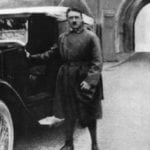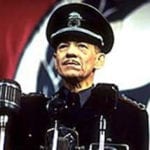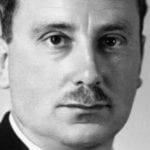 Miscellaneous
Miscellaneous  Miscellaneous
Miscellaneous  Gaming
Gaming 10 Funny Tutorials in Games
 History
History 10 Fascinating Little-Known Events in Mexican History
 Facts
Facts 10 Things You May Not Know about the Statue of Liberty
 Movies and TV
Movies and TV 10 Movie Adaptions That Brought Popular Songs to Life
 Health
Health 10 Miraculous Advances Toward Curing Incurable Diseases
 Miscellaneous
Miscellaneous 10 Undeniable Signs That People’s Views of Mushrooms Are Changing
 Animals
Animals 10 Strange Attempts to Smuggle Animals
 Travel
Travel 10 Natural Rock Formations That Will Make You Do a Double Take
 Movies and TV
Movies and TV 10 Actors Hidden in Your Favorite Movies
 Miscellaneous
Miscellaneous 10 Interesting Things Manufacturers Stopped Making and Why
 Gaming
Gaming 10 Funny Tutorials in Games
 History
History 10 Fascinating Little-Known Events in Mexican History
Who's Behind Listverse?

Jamie Frater
Head Editor
Jamie founded Listverse due to an insatiable desire to share fascinating, obscure, and bizarre facts. He has been a guest speaker on numerous national radio and television stations and is a five time published author.
More About Us Facts
Facts 10 Things You May Not Know about the Statue of Liberty
 Movies and TV
Movies and TV 10 Movie Adaptions That Brought Popular Songs to Life
 Health
Health 10 Miraculous Advances Toward Curing Incurable Diseases
 Miscellaneous
Miscellaneous 10 Undeniable Signs That People’s Views of Mushrooms Are Changing
 Animals
Animals 10 Strange Attempts to Smuggle Animals
 Travel
Travel 10 Natural Rock Formations That Will Make You Do a Double Take
 Movies and TV
Movies and TV 10 Actors Hidden in Your Favorite Movies
10 Reasons the German People Elected Adolf Hitler
The Nazis didn’t just seize power—they were voted in. It’s hard to imagine, but there was a time when Adolf Hitler was a name on a ballot in a democratic election. He was openly fascist and anti-Semitic, but the people chose to make him their leader. They supported him while he dissolved democracy.
SEE ALSO: 10 Bizarre Tales About Adolf Hitler
It’s easy to write off the rise of Nazism as a momentary lapse of reason, but the truth isn’t that simple. The people who voted for Hitler really thought they were making the best choice.
10 The War Guilt Clause
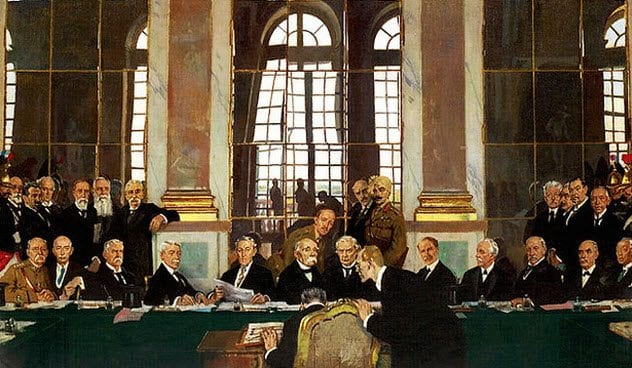
The fuse that sparked World War II was lit as soon as World War I ended. When peace was signed with the Treaty of Versailles, the Germans were forced to sign the “War Guilt Clause.” They had to put in writing that the war had been their fault alone.
Major restrictions were put on Germany as a result. They were forced to concede major parts of their territory. They were held responsible for all damages in the war and forced to pay 132 billion goldmarks in reparations, an expense that took up 10 percent of their annual national income.
Their military was kept in extreme checks. The German army was limited to 100,000 men, with no air force allowed at all. To most of the world, this was the beginning of a golden era of peace. But to many Germans, these were unfair restrictions that left them crippled.
From the very start, right-wing groups like the Nazis campaigned to tear up the Treaty of Versailles. They called it a “dictated peace” that oppressed the nation. At first, most Germans were so tired of war that they didn’t fight it. But, as the consequence of the treaty played out, that started to change.
9 The French Occupation Of The Ruhr
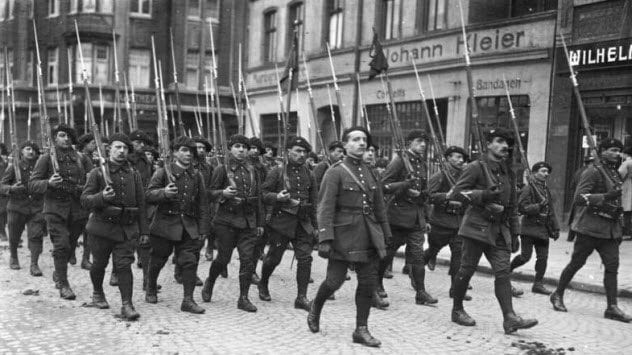
The German government couldn’t keep up with its reparations payments. By 1923, they were missing payments regularly, claiming that the burden was too much for them to handle. But the French were sure that this was a deliberate offense meant to test how far the Germans could provoke them. They struck back.
French and Belgian troops marched on Germany and took a part of the country called the Ruhr. This was Germany’s main center of coal, iron, and steel production. Without it, the German economy was completely crippled.
The people of the Ruhr tried to resist the occupation through passive resistance. They marched on strike, refusing to work for the French occupiers. It didn’t do any good. The French arrested the protesters and brought in their own workers to operate the mines. Peaceful resistance, the Germans were learning, was not working.
When the Germans caught up on their payments in 1925, the French left the Ruhr. By then, though, it was clear that land could be annexed and taken from the Germans at any moment. Slowly, the idea of tearing up the Treaty of Versailles was starting to seem more reasonable.
8 Hyperinflation
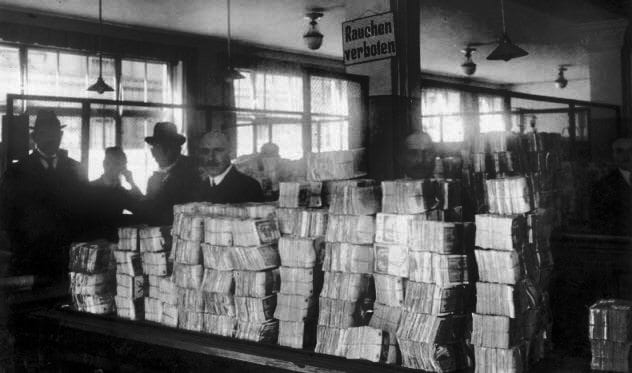
When the Ruhr was taken, inflation got out of control. The German mark had already been spiraling down in value. During World War I, the Germans had put 160 billion marks into their military. Now they were 156 billion marks in debt and owed 132 billion marks in reparations. With the Ruhr taken, they had lost one of the main forces in their economy.
The inflation in Germany was unbelievable. In 1914, before the war started, US$1 was worth 4.2 German marks. By 1923, the year the Ruhr was taken, US$1 was worth 4.2 trillion marks.
People across the country were starving. Money became completely worthless, and every penny a German had in savings was worth no more than kindling. People started to insist on being paid with food because nothing else had value.
In that year—1923—emigrations from Germany tripled. People were fleeing the country in which they’d lived. The suicide rate was skyrocketing. And in Germany’s darkest year, a young man named Adolf Hitler began his rise to power.
7 The Rise Of German Communism
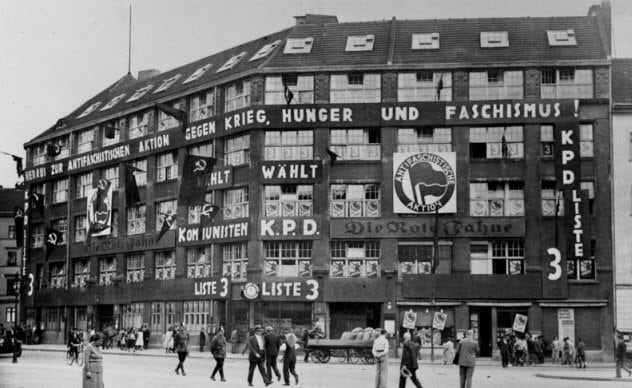
The Nazis weren’t the only party on the rise. Communism was taking hold in Germany as well. No Communist group outside Russia was more powerful than the Communist Party of Germany.
The Communist Party was formed in Germany in 1918, the year that World War I ended. When the Russian Revolution took over, though, the German Communists changed. They threw their full support behind the USSR. They wanted Bolshevism for Germany.
A minority of people—about 10–15 percent of Germany—liked the idea enough to vote Communist. For the rest of the country, though, this was a threat, and the rise of Communism was something deeply troubling and dangerous.
The Nazis played into this fear. They spread stories about the dangers of Bolshevism and the threat that a Red revolution might happen at home—and it worked. As the Communists became more popular, the rest of the population turned more right-wing in response.
Soon, the Nazis were sending out a group of thugs called the Sturmabteilung to start brawls with Communists on the streets—and it didn’t hurt their popularity at all. Bolshevism, the German people agreed, was a real danger. Hitler was just a man tough enough to keep it at bay.
6 The Barmat Scandal
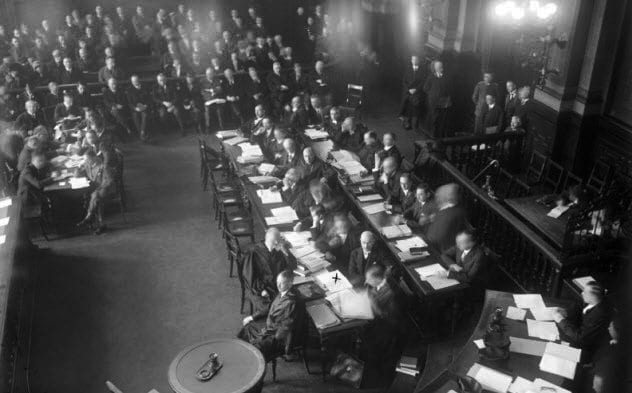
In 1924, the German government got caught accepting bribes. The Social Democratic Party, led by Chancellor Gustav Bauer, was in power at the time. They’d given millions of dollars to two Dutch investors, the Barmat brothers, who had promised to turn it into a fortune through currency speculation.
The Barmat brothers failed. Their investment company collapsed, and the German government lost millions. People started questioning why they’d been trusted with Germany’s money, and in the ensuing investigation, the answer became clear. Chancellor Bauer had been accepting bribes from the Barmats for years.
Chancellor Bauer was kicked out of office, and the Nazis jumped on the opportunity to make this a propaganda campaign. The Barmat brothers were Jewish, so the Nazis filled their papers with caricatures of corrupt Jewish businessmen. This, they argued, was proof that the government was corrupt—and that Jews were corrupt, too.
As late as 1930, the Nazis were still publishing campaign ads that brought up the Barmat scandal. Social Democrats, they said, were “Jews and Jewish lackeys,” voting for “the candidate of the Barmat block.”
5 Widespread Hatred Of Jews
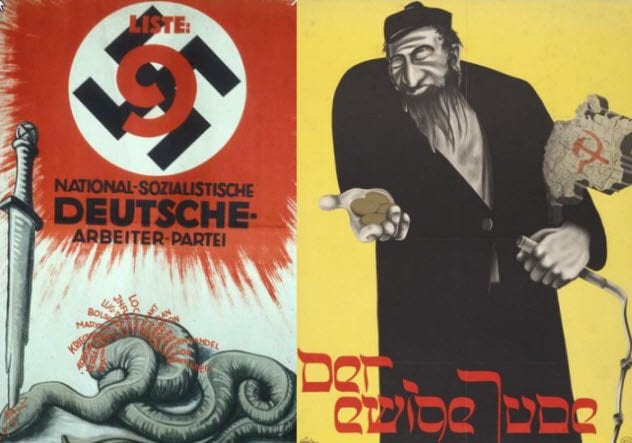
Anti-Semitism existed in Germany before the Nazi Party came to power. By the early 1900s, there were already parties running on specifically anti-Jewish platforms. After the Russian Revolution, hyperinflation and the Barmat scandal struck in the span of two years. As a result, being a German Jew became a lot more dangerous.
While most Germans were going bankrupt, the Jews were viewed as privileged, rich, and corrupt. Jews made up only 1 percent of the German population, but they were 16 percent of all lawyers, 10 percent of all doctors, and 5 percent of all editors and writers. Generally speaking, they were people who had money while others were starving, which won them a lot of resentment.
At the same time, the Bolshevik revolution in Russia was being blamed on Jews. The Germans believed that Jews were behind the growing Communist sentiment and would be a threat down the road.
Anti-Semitism became widespread. It wasn’t just the Nazis—almost every political party used anti-Semitic language in their campaigns. Hotels started refusing service to Jews. Priests started working criticism of Judaism into their sermons.
The Nazis led the charge. They promised to take control of Jewish shops and use them to lower expenses for the poor. The Nazis also started an organization supporting German doctors, helping them take jobs from Jews. They promised to muscle Jews out and keep Germans working—and a lot of Germans appreciated it.
4 The Stock Market Crash Of 1929
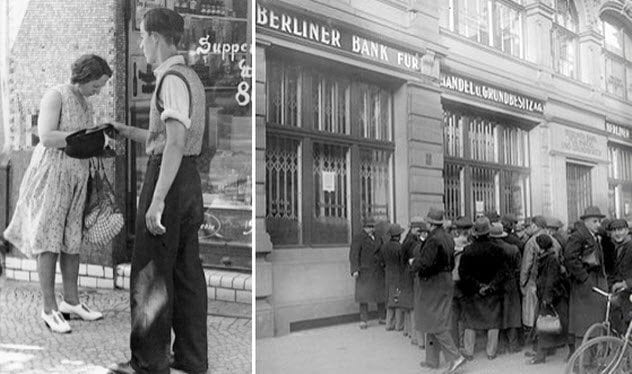
On October 29, 1929, the US stock market crashed. This was the beginning of the Great Depression, and few places were hit as hard as Germany.
What was left of the German economy was built on foreign money. They earned their wealth through foreign trade and, since 1924, had covered their costs through loans from the United States. When the Great Depression hit, those loans dried up, and the Americans started calling in the outstanding debts.
Germany was crippled. Industrial production dropped to 58 percent of its previous levels. Unemployment skyrocketed. By the end of 1929, 1.5 million Germans were out of work. By 1933, that number was up to six million.
Hitler was thrilled. With the economy collapsing, the German people were starting to doubt that a Democratic government could get things done. He said, “Never in my life have I been so well disposed and inwardly contented and in these days. For hard reality has opened the eyes of millions of Germans.”
3 The Social Democrats Skirted The Democratic Process
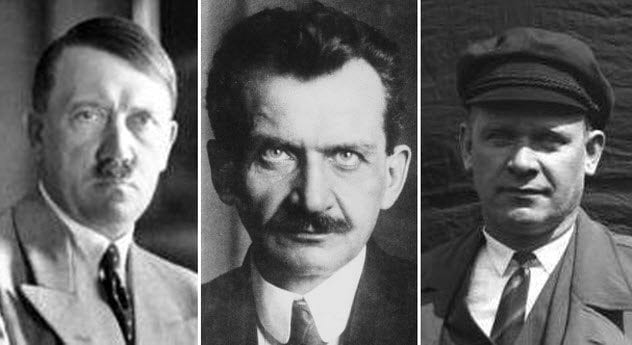
Shortly after the Great Depression began, the Social Democratic Party became more aggressive. As they only had a minority government, they couldn’t get any decisions through without the support of the other parties. So they found a work-around.
Article 48 of the German Constitution allowed the chancellor to make emergency decrees without following the democratic process. The Social Democrats made heavy use of it, first using it to put through a budget without approval from parliament. The people were furious. Socialist leader Dr. Rudolf Breitscheid called the Social Democratic Party a “veiled dictatorship.”
The Social Democrats called another election in 1930, hoping to get a majority so that they wouldn’t have to abuse Article 48. But it backfired. The Nazis campaigned like never before and skyrocketed in popularity.
In the 1928 election, the Nazis had only won 12 seats out of 491. After the reelection of 1930, they were up to 107 seats. In just two years, they went from a fringe party to the main opposition.
The reelection failed. The Social Democratic Party still didn’t have a majority. Although they kept using Article 48 to get decisions through, it didn’t do much to help the economy.
Two years later, another election was held. The German people were tired of the poverty and the corruption. They voted Nazi. What was once considered a group of radical extremists was now the ruling party of Germany.
2 The Reichstag Fire
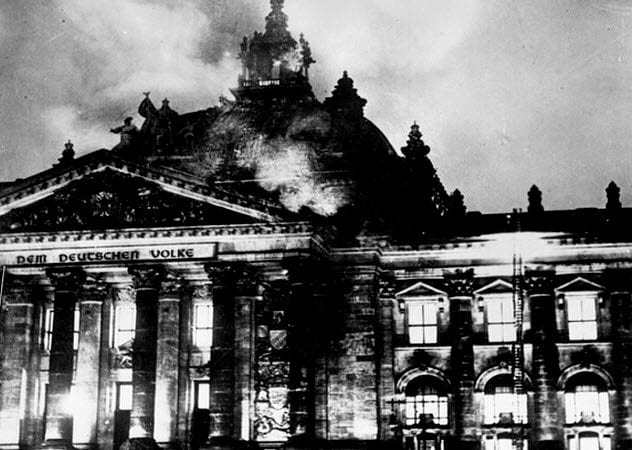
The Nazis were in power, but they didn’t have a majority. They had only won 37.3 percent of the vote. Like the Social Democratic Party, the Nazis believed that they would have to struggle through with a minority government—until the Reichstag fire.
Days after Hitler became chancellor, a Communist sympathizer named Marinus van der Lubbe burned down the Reichstag, the German parliament building. He had almost certainly worked alone, but the Nazis seized on the opportunity. This, they declared, was proof that the Communists were planning to violently overthrow the state.
The Nazis used Article 48 to put through the Reichstag Fire Decree. Freedom of speech, freedom of the press, the right to assembly, and restraints on police investigations were all suspended until the Communists could be put under control.
By using Article 48 for three years straight, the Social Democratic Party had already set a precedent. When the Nazis openly raided Communist Party offices and suppressed their publications, many people didn’t see it as a loss of rights. Instead, they saw it as a political party finally taking charge and doing something to make Germany a better place to live.
The Germans held another election on March 5, 1933. This time, though, the Communist Party wasn’t allowed to participate. So, with one opposition party out of the way, the Nazis got a majority government.
1 The Enabling Act
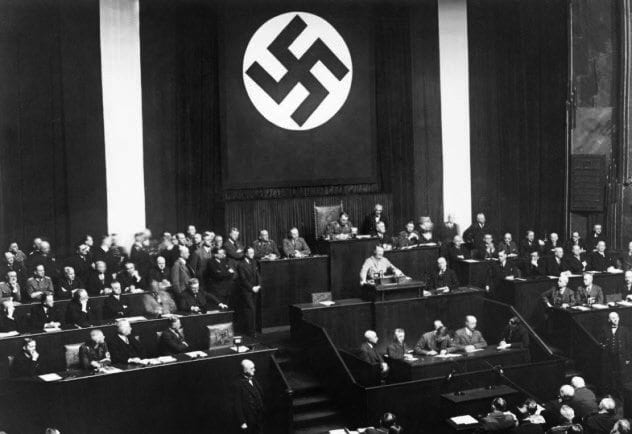
The Nazis were in power, but Germany was still a democracy—until they passed the Enabling Act. With this act in place, the Nazis had full power to enact any law without running it through parliament.
They needed support to do it, though. They need two-thirds of the parliament to vote for it, and they couldn’t do that without the support of other parties. So they pressured the others by reminding them of the Reichstag fire. A Nazi paper headline read, “Full powers—or else! We want the bill—or fire and murder!”
Hitler promised that he would use his increased powers sparingly. He promised, “The government will make use of these powers only insofar as they are essential for carrying out vitally necessary measures.”
The parties believed him. The Enabling Act won near-universal support. Only one party, the Social Democrats, voted against it. Hitler jeered them, shouting, “You are no longer needed! The star of Germany will rise, and yours will sink! Your death knell has sounded!”
Hitler had absolute power. The other political parties were dissolved, and soon, the elections were stopped altogether. German democracy was over. Fascism had taken control—and the people had voted it in.
